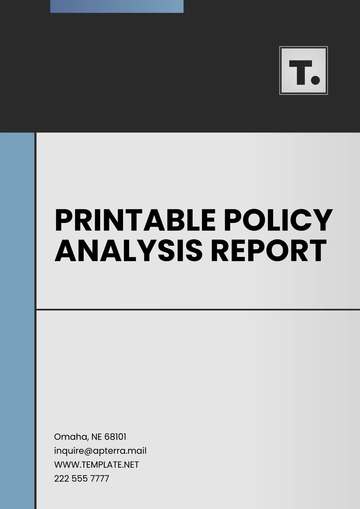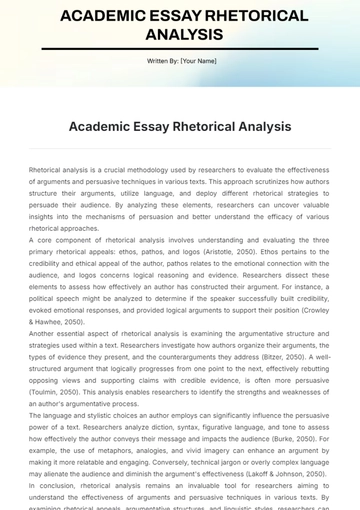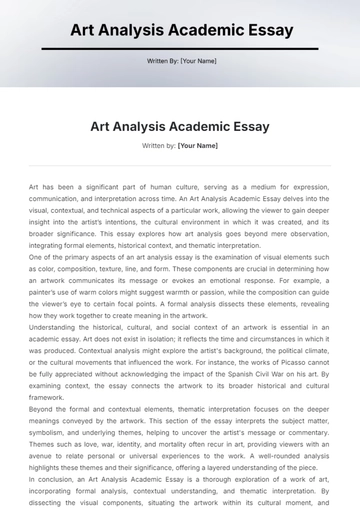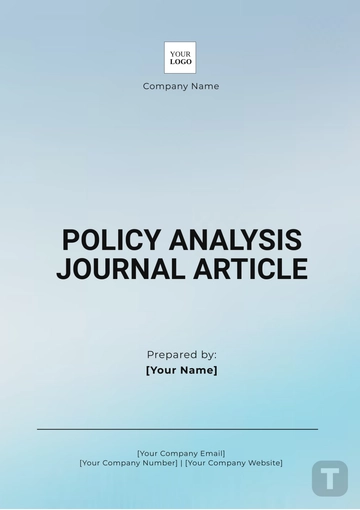Free Car Rental Analysis Report
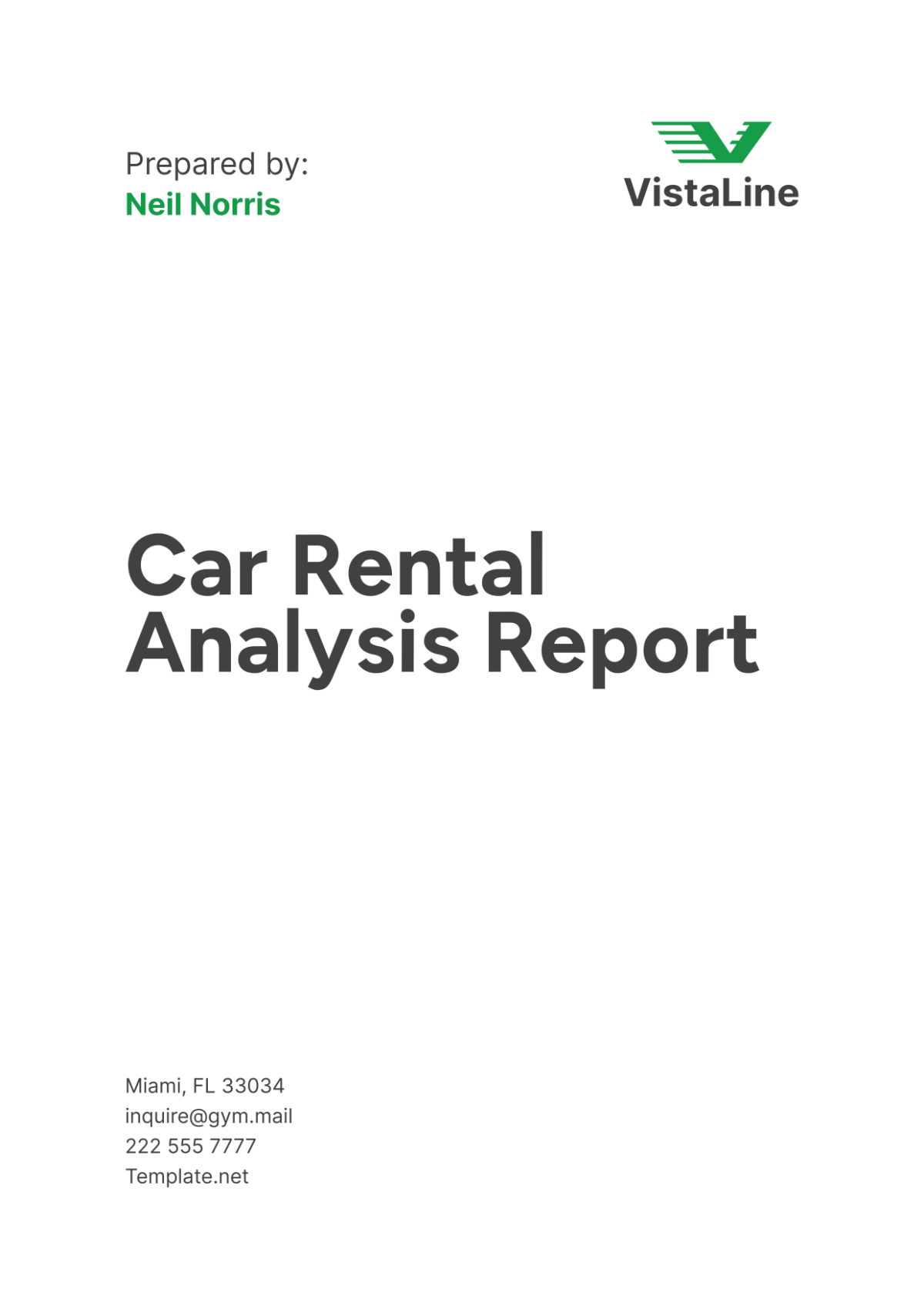
I. Executive Summary
A. Overview
The Car Rental Analysis Report provides an in-depth examination of the current trends, challenges, and opportunities within the global car rental industry. Commissioned by [Your Company Name], this report aims to equip stakeholders with strategic insights to navigate competitive landscapes and enhance operational efficiency.
B. Key Findings
Market Growth: The global car rental market is forecasted to grow at a compound annual growth rate (CAGR) of 7.5% from 2055 to 2060, driven by increasing urbanization, rising disposable incomes, and growing tourism activities worldwide.
Customer Preferences: There is a noticeable shift in consumer preferences towards eco-friendly options such as electric and hybrid vehicles. This trend reflects a broader societal movement towards sustainability and reduced carbon footprint.
Technological Integration: Companies that integrate advanced technologies like Internet of Things (IoT), artificial intelligence (AI), and blockchain are gaining a competitive edge. These technologies enable real-time fleet management, predictive maintenance, and personalized customer experiences.
C. Recommendations
Fleet Diversification: [Your Company Name] should consider expanding its fleet to include more electric and hybrid vehicles to cater to the increasing demand for sustainable transportation options.
Technology Adoption: Investing in IoT for real-time vehicle tracking and AI for personalized customer service can enhance operational efficiency and improve customer satisfaction.
Customer Experience Enhancement: Implementing user-friendly mobile apps and digital platforms can streamline the booking process and provide customers with personalized offers, thereby enhancing overall satisfaction and loyalty.
II. Industry Overview
A. Market Size and Growth
The car rental industry has experienced robust growth over the past decade, driven primarily by the expansion of global tourism and the rise of urban mobility solutions. In 2060, the global market size reached approximately $150 billion, marking a significant increase from $120 billion in 2055.
Table 1: Global Car Rental Market Size (2055-2060)
Year | Market Size (in billion USD) |
|---|---|
2055 | 120 |
2056 | 125 |
2057 | 130 |
2058 | 135 |
2059 | 142 |
2060 | 150 |
The growth trajectory is expected to continue, fueled by economic development in emerging markets and increasing disposable incomes in developed regions. As more consumers opt for convenience and flexibility in transportation, the demand for car rental services is likely to expand further.
B. Market Segmentation
By Vehicle Type:
Economy Cars: Constituting approximately 40% of the market, economy cars are popular among budget-conscious travelers and urban commuters.
Luxury Cars: Accounting for about 20% of the market, luxury vehicles cater to high-end clientele seeking comfort and prestige during travel.
SUVs: With a market share of 25%, SUVs appeal to families and outdoor enthusiasts looking for spacious and versatile transportation options.
Electric & Hybrid Cars: Representing 15% of the market and growing, electric and hybrid vehicles are gaining traction due to increasing environmental awareness and regulatory incentives.
By End-User:
Leisure Travelers: Comprising 60% of the market, leisure travelers seek convenient and affordable rental options for vacations and recreational trips.
Business Travelers: Accounting for the remaining 40%, business travelers rely on car rentals for transportation between meetings, conferences, and client visits.
C. Major Players
The global car rental market is highly competitive, dominated by several key players that include:
Enterprise Holdings: With a substantial market share, Enterprise operates a diverse fleet catering to both corporate and leisure markets.
Hertz Global Holdings: Known for its extensive network and premium service offerings, Hertz serves a wide range of customers globally.
Avis Budget Group: A major player in the industry, Avis Budget Group focuses on providing flexible rental solutions and innovative customer experiences.
Europcar Mobility Group: Based in Europe, Europcar is renowned for its environmentally friendly initiatives and diverse vehicle fleet.
Sixt SE: Known for its innovative rental concepts and premium vehicle selection, Sixt targets both corporate and leisure travelers.
These companies leverage extensive networks, strong brand reputations, and technological advancements to maintain competitive advantage in the dynamic car rental market.
III. Market Trends
A. Shift to Electric Vehicles
One of the most significant trends shaping the car rental industry is the increasing adoption of electric and hybrid vehicles. With growing concerns over environmental sustainability and regulatory pressures to reduce carbon emissions, consumers are increasingly opting for eco-friendly transportation solutions.
In response, [Your Company Name] can capitalize on this trend by expanding its fleet of electric and hybrid vehicles. By offering environmentally conscious options, [Your Company Name] can attract eco-minded customers and align with global sustainability goals.
B. Integration of Technology
Technological advancements play a pivotal role in transforming the car rental experience. Companies that integrate IoT, AI, and blockchain technologies into their operations can achieve greater operational efficiencies and enhance customer satisfaction.
IoT and Fleet Management: IoT sensors installed in vehicles enable real-time monitoring of vehicle performance, maintenance needs, and location tracking. This data-driven approach allows [Your Company Name] to optimize fleet utilization, reduce downtime, and improve overall service reliability.
AI and Customer Service: AI-powered chatbots and predictive analytics can personalize customer interactions, streamline booking processes, and offer tailored recommendations based on customer preferences and past behaviors. By leveraging AI, [Your Company Name] can enhance customer satisfaction and loyalty.
Blockchain and Security: Blockchain technology enhances transaction security and transparency in car rental transactions. By implementing blockchain-based smart contracts, [Your Company Name] can streamline payment processes, reduce fraud risks, and build trust with customers and business partners.
C. Demand for Flexible Rentals
The shift towards flexible rental options is driven by evolving consumer preferences for convenience and cost-effectiveness. Customers increasingly favor short-term rentals, one-way rentals, and car-sharing services over traditional long-term leases.
[Your Company Name] can cater to this demand by offering flexible rental solutions that accommodate varying customer needs and travel preferences. By diversifying its service offerings, [Your Company Name] can attract a broader customer base and enhance overall market competitiveness.
IV. Customer Analysis
A. Demographics
Understanding the demographic profile of car rental customers is crucial for [Your Company Name] to tailor its marketing strategies and service offerings effectively.
Tourists: Tourists constitute a significant portion (approximately 45%) of car rental customers. They rely on rental vehicles to explore new destinations, visit attractions, and travel conveniently during vacations.
Business Travelers: Business travelers account for approximately 35% of car rental customers. They require reliable transportation solutions for commuting between airports, hotels, and business meetings.
Local Residents: Local residents make up the remaining 20% of car rental customers. They often rent vehicles for personal use, such as running errands, visiting family, or during emergencies.
B. Preferences
Customer preferences play a critical role in shaping [Your Company Name]'s service offerings and customer experience strategies.
Convenience: Customers prioritize convenience when choosing car rental services. They prefer easy booking processes, flexible pickup/drop-off locations, and seamless integration with mobile apps for managing reservations.
Affordability: Competitive pricing and transparent fee structures are essential factors influencing customer decisions. Customers expect fair pricing without hidden charges, coupled with attractive discounts and promotional offers.
Sustainability: Increasingly, customers are concerned about environmental sustainability. They prefer rental companies that offer fuel-efficient vehicles, electric/hybrid options, and initiatives to minimize environmental impact.
Understanding these preferences allows [Your Company Name] to design customer-centric services that meet the evolving needs and expectations of its diverse customer base.
V. Competitive Analysis
A. SWOT Analysis
1. Strengths
Strong Brand Recognition: [Your Company Name] benefits from a robust brand reputation and customer loyalty, built on years of providing quality service and innovative solutions.
Diverse Fleet: [Your Company Name] maintains a diverse fleet of vehicles, including economy cars, luxury vehicles, SUVs, and eco-friendly options, catering to a wide range of customer preferences.
Technological Integration: By leveraging advanced technologies such as IoT, AI, and blockchain, [Your Company Name] enhances operational efficiency, improves service delivery, and differentiates itself in the competitive market.
2. Weaknesses
High Operating Costs: Maintaining and managing a large fleet of vehicles involves substantial operational expenses, including vehicle acquisition, maintenance, insurance, and fleet management software.
Customer Acquisition: Acquiring new customers in a competitive market requires significant marketing investments and efforts to differentiate [Your Company Name]'s offerings from competitors.
3. Opportunities
Expansion in Emerging Markets: Emerging economies present opportunities for [Your Company Name] to expand its market presence and tap into growing consumer demand for car rental services.
Technological Innovations: Continued advancements in technology offer opportunities to enhance service offerings, improve operational efficiency, and deliver superior customer experiences.
Partnerships and Collaborations: Forming strategic partnerships with airlines, hotels, and travel agencies can expand [Your Company Name]'s customer base and enhance brand visibility in key markets.
4. Threats
Regulatory Changes: Changes in regulations, including environmental standards, taxation policies, and data privacy laws, may impact [Your Company Name]'s operations and increase compliance costs.
Economic Volatility: Economic downturns or fluctuations in consumer spending can affect travel patterns and reduce demand for car rental services, posing a risk to revenue growth.
Intense Competition: The car rental industry is highly competitive, with established players and new entrants vying for market share by offering competitive pricing, innovative services, and superior customer experiences.
B. Competitor Benchmarking
Table 2: Competitor Benchmarking (2050)
Company | Market Share (%) | Fleet Size (000s) | Revenue (Billion USD) |
|---|---|---|---|
Enterprise Holdings | 30 | 1,500 | 50 |
Hertz Global Holdings | 25 | 1,200 | 40 |
Avis Budget Group | 20 | 1,000 | 35 |
Europcar Mobility | 15 | 800 | 25 |
Sixt SE | 10 | 600 | 20 |
[Your Company Name] competes with industry leaders by focusing on innovation, customer-centric services, and strategic partnerships to strengthen its market position and sustain long-term growth.
VI. Financial Analysis
A. Revenue Analysis
In 2050, the global car rental industry generated approximately $150 billion in revenue. The majority of revenue came from leisure travelers, who accounted for 60% of the market share.
B. Cost Analysis
Understanding cost structures is essential for [Your Company Name] to manage expenses effectively and optimize profitability.
Fleet Acquisition: Acquiring vehicles represents a significant portion of [Your Company Name]'s expenses. Costs include purchasing new vehicles, leasing agreements, and fleet upgrades to meet customer demand and fleet diversification strategies.
Maintenance and Repairs: Regular maintenance and repair costs are necessary to ensure vehicle safety, performance, and compliance with regulatory standards. [Your Company Name] invests in preventive maintenance programs and partnerships with authorized service providers to minimize downtime and operational disruptions.
Insurance: Insurance premiums are essential to protect [Your Company Name]'s assets, fleet vehicles, and liability coverage against accidents, theft, and damage. [Your Company Name] collaborates with insurance providers to tailor coverage options that mitigate risks and ensure comprehensive protection.
Administrative Costs: Administrative expenses encompass overhead costs related to office operations, customer service, marketing, and administrative staff salaries. [Your Company Name] focuses on cost-effective strategies, automation, and process improvements to streamline operations and reduce administrative expenses.
Marketing and Sales: Marketing and sales initiatives are essential to attract new customers, promote [Your Company Name]'s brand, and increase market visibility. [Your Company Name] invests in digital marketing campaigns, social media engagement, and loyalty programs to enhance customer acquisition and retention efforts.
C. Profitability Analysis
The average profit margin in the car rental industry ranges from 8% to 12%, influenced by factors such as operational efficiency, competitive pricing strategies, and economic conditions. Companies that effectively manage costs, optimize fleet utilization, and leverage technology-driven solutions can achieve higher profit margins and sustain profitability in a competitive market environment.
VII. Technological Integration
A. IoT and Real-Time Tracking
IoT technology enables [Your Company Name] to monitor and track fleet vehicles in real time, enhancing operational efficiency and customer service delivery. IoT sensors installed in vehicles provide valuable data insights on vehicle location, performance metrics, fuel consumption, and maintenance needs.
By leveraging IoT-enabled fleet management systems, [Your Company Name] can optimize route planning, reduce idle time, schedule preventive maintenance tasks proactively, and improve overall fleet productivity. Real-time tracking capabilities also enhance vehicle security, mitigate risks of theft or unauthorized use, and ensure compliance with regulatory requirements.
B. AI and Machine Learning
AI and machine learning algorithms empower [Your Company Name] to analyze vast amounts of data, predict customer preferences, and personalize service offerings. AI-driven chatbots and virtual assistants enhance customer interactions by providing timely assistance, answering queries, and facilitating seamless booking experiences.
Machine learning models optimize pricing strategies, forecast demand patterns, and recommend tailored vehicle options based on customer profiles, travel preferences, and historical booking behaviors. By harnessing AI capabilities, [Your Company Name] can optimize resource allocation, improve operational decision-making, and enhance customer satisfaction levels.
C. Blockchain
Blockchain technology enhances transactional transparency, security, and trust in car rental operations. [Your Company Name] leverages blockchain-based smart contracts to automate rental agreements, enforce terms and conditions, and streamline payment processing.
Smart contracts executed on blockchain networks facilitate instant, secure, and tamper-resistant transactions between [Your Company Name], customers, and third-party service providers. Blockchain technology enhances data integrity, reduces administrative overheads, and mitigates risks associated with payment disputes or fraudulent activities.
By adopting blockchain solutions, [Your Company Name] strengthens operational efficiency, enhances regulatory compliance, and fosters trust and transparency across its ecosystem of stakeholders.
VIII. Environmental and Regulatory Considerations
A. Environmental Impact
The car rental industry faces increasing scrutiny regarding its environmental footprint and sustainability practices. [Your Company Name] acknowledges the importance of reducing carbon emissions, promoting energy-efficient vehicles, and adopting eco-friendly business practices.
To mitigate environmental impact, [Your Company Name] expands its fleet of electric and hybrid vehicles, invests in renewable energy sources, and implements eco-friendly initiatives. By offering customers sustainable transportation options, [Your Company Name] aligns with global environmental goals, attracts environmentally conscious consumers, and enhances brand reputation as a responsible corporate citizen.
B. Regulatory Compliance
Compliance with regulatory requirements is crucial for [Your Company Name] to operate ethically, sustainably, and lawfully in global markets. Regulatory standards encompass environmental regulations, safety standards, data protection laws, taxation policies, and consumer protection measures.
[Your Company Name] maintains strict adherence to regulatory guidelines, conducts regular audits, and implements robust compliance frameworks. By prioritizing regulatory compliance, [Your Company Name] mitigates legal risks, fosters trust with customers, and demonstrates commitment to ethical business practices.
IX. Future Outlook
A. Market Projections
The car rental industry is poised for continued growth and innovation, driven by technological advancements, changing consumer behaviors, and economic developments. Global market projections indicate substantial expansion, with the industry expected to reach an estimated $300 billion by 2060.
Factors contributing to market growth include:
Technological Innovations: Continued advancements in IoT, AI, blockchain, and autonomous vehicle technologies enhance operational efficiencies, improve service quality, and expand market opportunities.
Urbanization and Mobility Solutions: Urbanization trends, increasing population densities, and demand for convenient transportation solutions drive the adoption of car rental services among urban dwellers and travelers.
Sustainability Initiatives: Growing environmental awareness prompts consumers to choose eco-friendly transportation options, such as electric and hybrid vehicles, contributing to market expansion and sustainability goals.
B. Emerging Opportunities
Autonomous Vehicles: The development and deployment of autonomous vehicle technologies present new opportunities for [Your Company Name] to innovate and transform the car rental experience. Autonomous vehicles offer potential benefits, including enhanced safety features, reduced operational costs, and improved mobility solutions for customers.
Subscription Models: Monthly car rental subscriptions and mobility-as-a-service (MaaS) platforms gain popularity as alternatives to traditional car ownership. Subscription models offer flexibility, cost-effectiveness, and convenience for customers seeking on-demand transportation solutions.
C. Strategic Recommendations
Expand Fleet Diversity: [Your Company Name] should prioritize expanding its fleet of electric and hybrid vehicles to meet growing consumer demand for sustainable transportation options. By offering eco-friendly choices, [Your Company Name] can attract environmentally conscious customers and differentiate its service offerings in the competitive market.
Enhance Digital Transformation: Investing in advanced digital platforms, mobile applications, and customer relationship management (CRM) systems enhances [Your Company Name]'s ability to deliver personalized customer experiences, streamline operations, and optimize service delivery.
Strengthen Partnerships: Form strategic partnerships with airlines, hotels, tourism agencies, and corporate clients to expand market reach, enhance brand visibility, and increase customer acquisition. Collaborative efforts enable [Your Company Name] to offer integrated travel solutions, loyalty programs, and bundled service offerings that appeal to diverse customer segments.
By implementing these strategic recommendations, [Your Company Name] can position itself for sustainable growth, innovation, and leadership in the evolving car rental industry landscape.
X. Conclusion
A. Summary
The Car Rental Analysis Report provides a comprehensive overview of the global car rental industry, highlighting key trends, challenges, and opportunities for [Your Company Name]. By leveraging technological advancements, embracing sustainability initiatives, and prioritizing customer-centric strategies, [Your Company Name] can achieve operational excellence, enhance market competitiveness, and drive long-term profitability.
B. Final Recommendations
[Your Company Name] is encouraged to focus on expanding its fleet with electric and hybrid vehicles, integrating advanced technologies for operational efficiency, and enhancing customer engagement through digital platforms and personalized services. These initiatives enable [Your Company Name] to meet evolving customer expectations, capitalize on emerging market trends, and sustain growth in a competitive industry landscape.
C. Contact Information
For further information, inquiries, or collaboration opportunities, please contact:
[Your Company Name]
[Your Company Address]
[Your Company Number]
[Your Company Email]
[Your Company Website]
- 100% Customizable, free editor
- Access 1 Million+ Templates, photo’s & graphics
- Download or share as a template
- Click and replace photos, graphics, text, backgrounds
- Resize, crop, AI write & more
- Access advanced editor
Generate comprehensive analysis reports with the Car Rental Analysis Report Template on Template.net. This editable tool offers customizable features. Utilize our Ai Editor Tool to compile data and insights effectively, facilitating informed decision-making and enhancing operational efficiency in your car rental business.





